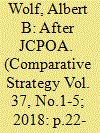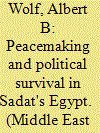| Srl | Item |
| 1 |
ID:
164609


|
|
|
|
|
| Summary/Abstract |
If grand strategy is a state's theory of how to produce security for itself, what should the U.S. grand strategy be toward Iran? This is an important question that has only grown since the Trump administration announced it would not recertify Iran under the Joint Comprehensive Plan of Action (JCPOA). This article lays out four options: rollback, offshore balancing, retrenchment, and engagement. Each strategy has its merits as well as its drawbacks.
|
|
|
|
|
|
|
|
|
|
|
|
|
|
|
|
| 2 |
ID:
150092


|
|
|
|
|
| Summary/Abstract |
This article investigates the nuclear postures available to Israel in the wake of the Joint Comprehensive Plan of Action (JCPOA) between Iran and the P5 + 1. An “existential bias” pervades much of the literature on nuclear postures. Most scholars assume that once a state acquires the bomb it can deter all forms of aggression. However, recent scholarship has shown this to be untrue given that regional nuclear powers operate under much greater constraints than the U.S. and Russia or the Soviet Union. Israel faces tradeoffs between three postures: a catalytic posture, which would involve greater reliance upon the U.S.; assured retaliation, its current posture; and first use. Should Jerusalem continue to fear the prospect of abandonment by the U.S., it may turn to a first-use posture in order to leverage its conventional and nuclear superiority over its neighbors.
|
|
|
|
|
|
|
|
|
|
|
|
|
|
|
|
| 3 |
ID:
142170


|
|
|
|
|
| Summary/Abstract |
Does the Arab Street hold authoritarian leaders to account for their failures on the battlefield? Sir John Bagot Glubb, the British head of the Arab Legion, noted several years after Israel's War for Independence that it was the “Street” that pushed Arab statesmen to go to war, rather than any clear strategic rationale
|
|
|
|
|
|
|
|
|
|
|
|
|
|
|
|
| 4 |
ID:
133629


|
|
|
|
|
| Publication |
2014.
|
| Summary/Abstract |
What are the domestic political consequences of peacemaking for dictators? The conventional wisdom suggests that nations are better off reaching settlements that allow them to avoid the costs of war.1 The effectiveness of cooperation with autocracies is of interest to policy makers and international-relations theorists alike. Debates over issues such as the First Step Agreement with Iran or U.S.-China policy have focused on the effectiveness of engagement (defined as attempts to influence the behaviors of a target state through positive inducements).2 States sometimes cooperate with their rivals, expecting that engagement will bolster the political fortunes of moderates in the target regime
|
|
|
|
|
|
|
|
|
|
|
|
|
|
|
|
| 5 |
ID:
175672


|
|
|
|
|
| Summary/Abstract |
Beginning with the post-2003 Iraq War and accelerating with the Great Recession of 2007, many scholars and pundits have concluded that the United States is in a state of relative material decline and it is necessary to abandon its long-standing grand strategy of “deep engagement” and replace it with one of retrenchment, “a policy of retracting grand strategic commitments in response to decline in relative power.” This is necessary in order to balance America’s commitments with its declining resources. However, retrenchment is not a one-size-fits-all grand strategy; there are degrees, ranging from internal retrenchment, redistribution and redeployment, and complete withdrawal. This essay analyzes what each of these degrees of retrenchment would mean for America’s traditional interests in the Middle East: maintaining the flow of Persian Gulf oil, stemming the proliferation of nuclear weapons, and the containment of Iran.
|
|
|
|
|
|
|
|
|
|
|
|
|
|
|
|